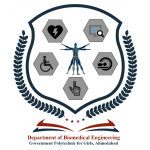
What is Biomedical Engineering?
Biomedical
engineering is the application of the principles and problem-solving techniques
of engineering to biology and medicine. Engineering itself is an innovative
field, the origin of ideas leading to everything from automobiles to aerospace,
skyscrapers to sonar. Biomedical engineering focuses
on the advances that improve human health and health care at all levels.
Biomedical engineers differ from other engineering disciplines that have an
influence on human health. Biomedical engineers use and apply an intimate
knowledge of modern biological principles in their engineering design process.
Aspects of mechanical engineering, electrical engineering, chemical
engineering, materials science, chemistry, mathematics, and computer science
and engineering are all integrated with human biology in biomedical engineering
to improve human health, whether it is an advanced prosthetic limb or a
breakthrough in identifying proteins within cells. There are many sub
disciplines within biomedical engineering, including the design and development
of active and passive medical devices, orthopedic implants, medical imaging,
biomedical signal processing, tissue and stem cell engineering, and clinical
engineering, just to name a few.
What
do Biomedical engineers do?
Biomedical
engineers basically work in diverse
settings and disciplines. There are opportunities to innovate, design and
develop new technologies in industries, to research or push the boundaries of
what is medically possible while working in academic institutions, or to test,
implement and develop new diagnostic, therapeutic, analytical or imaging
equipments and tools. Biomedical engineers have immense opportunities to work
in government agencies to set standards for medical equipments. They may find
the opportunity to work in cutting edge start-up industries as an employee or
as an entrepreneur themselves or they also can design software for medical
equipments under the field of biomedical signal processing. Tissue and stem
cell engineering, clinical engineering, rehabilitation engineering,
biomaterials and biomechanics are some of the areas which have immense scope
for the Biomedical engineers. Biomedical
engineers can also opt to work in hospitals for the selection, purchase,
installation, operation, calibration and maintenance of medical equipments in
hospitals and be a helpful hand for the medical professionals who have very
poor knowledge of the technical aspects of the equipments they use. The career paths the Biomedical engineers
choose largely depends on the interest of the individual and the wide area of
biomedical engineering develop their interest and specialties in specific
fields.
The Future of Biomedical Engineering
